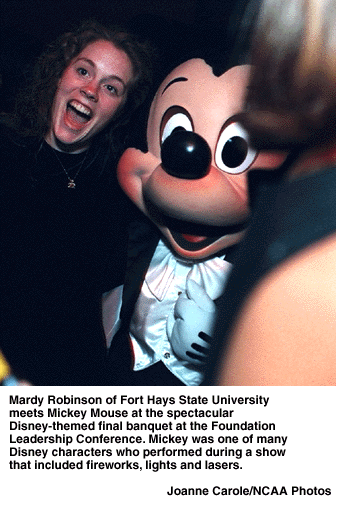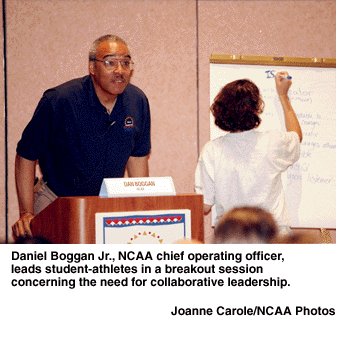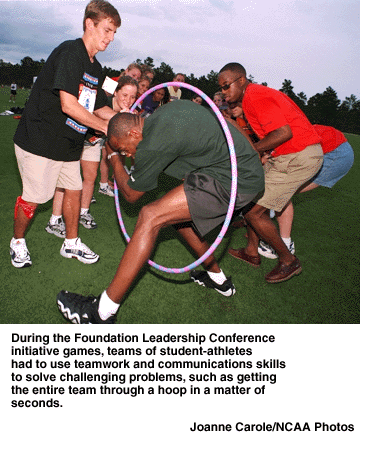The NCAA News - News and FeaturesJune 8, 1998
Media was the message at leadership conference
Student-athlete image discussion among highlights of three-day event
BY KAY HAWES
STAFF WRITER
 LAKE BUENA VISTA, Florida -- Like young Simba in Disney's "Lion King," a group of young student-athletes took their potential and their desire to be leaders and stepped into the sun at the NCAA Foundation Leadership Conference last week. LAKE BUENA VISTA, Florida -- Like young Simba in Disney's "Lion King," a group of young student-athletes took their potential and their desire to be leaders and stepped into the sun at the NCAA Foundation Leadership Conference last week.
And like Simba, they knew they were smart and strong, but they were also struggling with the fact that their manes are not yet long enough for some people to take them seriously.
But they used the event to develop skills, learn more about important issues and -- in the spirit of Simba -- to work on their roar.
The most frequently discussed topics were leadership, image and the media, but in reality, there was no limit on the dialogue that occurred at the second annual conference.
The event, conducted at Disney's Coronado Springs Resort, featured 370 student-athletes, chosen from among more than 850 student-athletes nominated by NCAA institutions across the country.
The May 25-28 conference included breakout sessions on leadership-related topics such as communication, collaboration and ethics, and was packed with nationally known speakers, thought-provoking exercises and a bit of Disney magic.
The media panel presentations and accompanying question-and-answer session provided one of the many memorable moments in the conference.
The panel included USA Today president and publisher Tom Curley, ESPN news editor Jonell McFadden Priddle, SHAPE magazine's women's sports editor Dagny Scott and Atlanta Journal-Constitution sports columnist Terence Moore.
Kathryn Reith, senior manager of U.S. corporate communications for NIKE, was the panel's moderator.
The topic of the panel, "Is Perception Reality? What role does the media play in shaping student-athlete image?" was one that captured the interest of nearly every one of the 370 student-athletes in the room.
The issue on several student's minds, and asked in a variety of ways, was "Why don't we receive more positive coverage?"
Several student-athletes spoke of doing good work in their communities that they believe is rarely noticed by the media. They also voiced concerns that any negative action by a student-athlete, on or off the court, becomes news.
"It's not our job to be a PR person for a team or an athlete," Moore responded. "Our job is to report the news as it happens."
 ESPN's Priddle echoed the sentiments of others on the panel when she remarked that an athlete doing a good deed simply was not news, although it might be if the athlete spent a great deal of time on a particular cause. ESPN's Priddle echoed the sentiments of others on the panel when she remarked that an athlete doing a good deed simply was not news, although it might be if the athlete spent a great deal of time on a particular cause.
Moore mentioned during his presentation that he was tired of hearing Charles Barkley's oft-quoted claim that he was not a role model.
"Every time I see that commercial, I want to throw the television. Athletes are constantly being scrutinized by young people. We're all role models, whether we like it or not," Moore said.
When some students questioned Moore's assertion that they were role models, he responded, "Every one of us has somebody looking up to us. The more visibility we have, the more responsibility we must have. I did not make Charles Barkley throw a guy through a plate glass window. When he does that, I'm going to report it."
Priddle noted that ESPN generally will not report that an individual is suspected of a crime until the person is actually charged with it.
"We don't see it as our role to make them look good," she said. "We don't try to make them look bad either. We think their actions on the field speak for themselves."
Priddle also noted that ESPN would not overlook an athlete's transgressions. "All of the news out there is not good," she said. "A lot of it is but a lot of it is not, and we have a responsibility to report both sides."
Moore had given the student-athletes a list of tips to improve their chances of positive coverage, including maintaining good eye contact, giving more than one-word answers and looking interested.
When one football player said that he didn't feel like giving interviews after a game because he was tired, he drew a variety of reactions from the student-athletes, from applause to quiet disagreement.
"I plan to be a teacher some day," a female basketball player said later. "If I'm tired at the end of a full day, I'll still have to answer questions from parents. It'll be part of my job, just like answering questions from the media is now."
Several panelists reminded the student-athletes that the media was interested in making money. "Time is of the essence," Curley said, referring to efforts USA Today had made to get photographs of Picabo Street's gold-medal Olympic performance. "What is a minute? What is a fraction of a minute? It is thousands and thousands of dollars. It's an era of fierce competition."
Scott pointed out that some road races, including one recently held in Boulder, Colorado, had limited the numbers of foreign athletes who were allowed to participate, partly because they didn't speak English and were not quotable. "Unfortunately, sports is a business," she said. "Here's why you should care (about giving interviews): sponsors. Sponsors aren't as interested in these foreign athletes. Why? Because they don't give good interviews to the media."
The media panel was so popular that, even though it was allowed to run over on time, at least 12 student-athletes were still in line to ask questions when it concluded. About 20 student-athletes went up to the panelists afterward to ask their own question or to continue the discussion.
 Being a role model is 'a gift' Being a role model is 'a gift'
And, while the student-athletes may not have liked some of the answers they received during the media panel, it definitely was an educational experience.
"I think it was a good thing," said Betsy Emerson, head women's cross country and track and field coach at Luther College and a member of the coaches' panel later in the conference.
"I was impressed by the people on the panel because they were frank and honest. They told it like it was, and the student-athletes need to hear that."
Even student-athletes who hadn't asked any questions thought the media and athlete image was an important topic to discuss.
"I'm not naïve to the fact that media is about money," said Robert Covington, a track student-athlete from the University of Florida. "Money makes the world go 'round. I also understand that anything out of the ordinary gets reported.
"But we can't get a chip on our shoulders. We have to give interviews. We have to represent ourselves, and we have to represent our universities. The more positive image we can reflect, the more benefit we're going to get. If we can portray a positive image, I believe positive things will come."
Not all were critical of the media.
"Where I'm from, the media does a pretty good job," said Chad Kroell, a quarterback at Pennsylvania State University. "Mr. Moore -- you could see where he's coming from. I wish everyone could get equal representation, but that's not how it is. But if enough people talk to (media) people personally, if you cooperate with them, that will help."
Kroell and Covington both said that their universities have media programs or workshops.
"We're taught to be humble; don't make yourself or your team a target," Kroell said. "I do think athletes are role models. If you're an athlete, no matter what level, someone's going to be looking up to you. You have a big influence on a lot of people."
Kroell also pointed out that it is up to student-athletes to help others on their team avoid negative publicity. "If you see your teammate doing something, or being somewhere he shouldn't, you have to say something to him and tell him why it matters," he said. "It would be bad for the person and it would be bad for the team."
Ryk Neethling, a native of South Africa, currently a swimmer at the University of Arizona, said he came away from the panel with mixed feelings.
"I think the media is just doing their job," he said. "It's what the public wants. Everyone in the world wants to know the bad stuff. It's not the media's fault. As student-athletes we sometimes give them the opportunity to write about that stuff.
"I do think the media need to take a role in portraying a full picture of student-athletes. I think it is their job. It's kind of like lying to show just one side of us."
Neethling said his school had prepared him to deal with the media. "I think that's essential for schools to have," he said. "Even if you're a small school, you can start with how to deal with your school newspaper."
Christina Ervin, a basketball player from East Tennessee State University, said that while she thought the media could do a better job presenting all sides of a story, not all student-athletes are unhappy about being role models.
"I don't see it as a responsibility," she said. "I see it as a gift."
A favorite media figure
Robin Roberts, a sports commentator for ESPN and ABC Sports and a former basketball player for Southeastern Louisiana University, had the chance to address the student-athletes twice -- once in her capacity as emcee for a special Disney-themed banquet and once in more of a question-and-answer forum that closed the conference.
Roberts was able to address some of the remaining questions student-athletes had about media and the image of athletes. "Personally, I know I'm more sensitive about it because I was a student-athlete," she said.
Roberts also noted that some athletes she had interviewed, such as Michael Jordan, made an effort to be pleasant to the media and to their fans.
She encouraged student-athletes to work with their sports information directors to provide good news to broadcasters and print journalists in their local markets.
"I know there were times when I would have loved to have had somebody send me a press release," Roberts said. "Make it easy for them."
More important to be nice
Many student-athletes appeared to enjoy the remarks of Dave Gavitt, the chairman of the board of trustees at the Naismith Memorial Basketball Hall of Fame. A former student-athlete himself, Gavitt spoke on "Accepting the Responsibility of Leadership."
"When you go out as the track athlete from Florida or the softball player from Ohio, you are already in a leadership position, and you are already representing your institution," Gavitt told the student-athletes.
Gavitt gave the student-athletes his tips on how to be successful.
"It's nice to be important, but it's much more important to be nice. Thank you is a complete sentence. You need to say thank you to the people who tape your ankles, to the people who are the janitors."
"Character is caught, not taught. Character is something you 'catch' from someone else. You have the opportunity to be the carrier of character."
"Every sport is a team sport. At its root, life is a team sport."
"Coaches come in all sizes. They only have one thing in common: They all want to win."
"There are two games you play. One is your game and one is with the media. And you do have to play that game. Remember, when someone owns the airwaves, owns the channel or buys ink by the barrel, you can't win against them. Be friendly with them, but don't let them be your friend."
"Don't take yourself too seriously. When things are at their darkest, remember, there are 794 million people in the world who speak Mandarin Chinese. They don't know who the hell you are, and they don't care."
"To whom much is given, much is expected. We have a lot riding on you and we know you're going to accept this mantle of leadership like the champions you are."
Something to take back
One recurring theme of the conference was that student-athletes should go back to their own communities, their own campuses and their own teams and take back what they learned about leadership.
Event organizers will be happy to know that student-athletes heard that message, loud and clear.
"I had the greatest time here," said Kelly Meyers, a volleyball player from the University of Pittsburgh. "I was impressed with the demeanor and the manner of the athletes. This is really encouraging. It gives me faith and encouragement to take back to my university."
Meyers also got the message about serving as a role model. "I think there couldn't be a better role model than the student-athlete," she said. "I think this conference really brought that home. We're role models on the court and off the court. That's one of the things I'm really taking home from this conference."
Molly Carr, a basketball player from Indiana University of Pennsylvania, plans to get more involved in the student-athlete advisory committee on her campus. "To listen and hear someone else say, 'This is what I did, you can do it,' meant a lot to me," she said. "I'm going to go do it."
Carr also plans to take being a leader seriously. "When I grew up, I didn't really have any female athlete role model until my senior year of high school, but I never let being a woman stop me from doing what I wanted," Carr said, noting that her role models were her five older brothers.
"Now, I want to be that good role model for someone else to look up to."
The presenting sponsor was Entergy Corp., and American Express and Delta Air Lines provided additional sponsorship assistance.
|